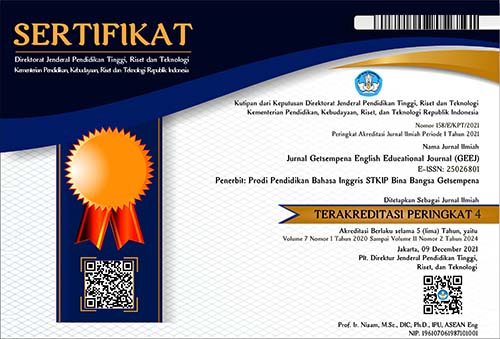A SMARTPHONE-BASED ADAPTIVE LEARNING APPROACH TO ENHANCE STUDENTS’ LEARNING OUTCOMES IN ENGLISH SUBJECT
Abstract
The purpose of this study is to improve student learning outcomes through a smartphone-based adaptive learning approach to 28 students from the 11th grade students in the 2020/2021 academic year. It is important to consider the educational context when evaluating the barriers to adopting adaptive learning approaches on digital platforms. The method used in this study is a quantitative method, everything observed was measured and converted into numbers so that statistical analysis techniques were possible. The author chose a pre-experimental design with a pre-test post-test group design, in which a group of subjects is taken from a certain population and performed in a pre-test and then undergoes treatment one after another. After the treatment, the person received a posttest to measure the learning outcomes of the group. The grades given have the same weight. The difference between the results of the pretest and the post-test shows the results of the treatment performed. The results of this study were analyzed using the t-test by comparing the mean values of the pre-test and post-test. The results showed that the t-observation value (7.8) was higher than the t-table value (1.70562) at the 5% significance level. It can be concluded that the learning approach adaptive smartphone-based improves student learning outcomes in English subjects.
References
Ary, D., Jacobs, L. C., & Sorensen, C. K. (2016). Introduction to research in education (8th ed.). Cengage Learning.
Barteit, S., Jahn, A., Bowa, A., Lüders, S., Malunga, G., Marimo, C., Wolter, S., & Neuhann, F. (2018). How Self-Directed e-Learning Contributes to Training for Medical Licentiate Practitioners in Zambia: Evaluation of the Pilot Phase of a Mixed-Methods Study. JMIR Medical Education, 4(2), e10222. https://doi.org/10.2196/10222
Blanchard, E. G. (2015). Socio-cultural imbalances in AIED research: Investigations, implications and opportunities. International Journal of Artificial Intelligence in Education. https://doi.org/10.1007/s40593-014-0027-7
Conn, K. M. (2017). Identifying Effective Education Interventions in Sub-Saharan Africa: A Meta-Analysis of Impact Evaluations. Review of Educational Research. https://doi.org/10.3102/0034654317712025
Gavrilović, N., Arsić, A., Domazet, D., & Mishra, A. (2018). Algorithm for adaptive learning process and improving learners’ skills in Java programming language. Computer Applications in Engineering Education, 26(5), 1362–1382. https://doi.org/10.1002/cae.22043
Holmes, W., Anastopoulou, S., Schaumburg, H., & Mavrikis, M. (2018). Technology-enhanced Personalised Learning : Untangling the Evidence. August, 116.
Kitchenham, A. (2011). Models for Interdisciplinary Mobile Learning: Delivering Information to Students (1st ed.). IGI Global.
Luckin, R., Holmes, W., Griffiths, M., & Forcier, L. B. (2016). Intelligence-Unleashed-Publication. https://www.pearson.com/content/dam/one-dot-com/one-dot-com/global/Files/about-pearson/innovation/Intelligence-Unleashed-Publication.pdf
Ma, W., Adesope, O. O., Nesbit, J. C., & Liu, Q. (2014). Intelligent tutoring systems and learning outcomes: A meta-analysis. Journal of Educational Psychology. https://doi.org/10.1037/a0037123
Martin, E. (2015). Teaching and Learning Physics with Smartphones. May. https://doi.org/10.4018/JCIT.2015010103
Nye, B. D. (2015). Intelligent Tutoring Systems by and for the Developing World : A Review of Trends and Approaches for Educational Technology in a Global Context. 177–203. https://doi.org/10.1007/s40593-014-0028-6
PC Magazine Encyclopaedia. (2013). Smartphone. In PC Magazine Encyclopaedia. http://www.pcmag.com/encyclopedia/term/51537/smartphone
Quinn, C. (2011). The mobile academy: mLearning for higher education (1st ed.). John Wiley & Sons.
Rogozin. (2012). Physics Learning Instruments of XXI Century. Proceedings of the World Conference on Physics Education 2012, 1–1432.
Saufi, M. (2018). PENGARUH SMARTPHONE TERHADAP PRESTASI BELAJAR SISWA KELAS 8 MTs.WALI SONGO SUGIHWARAS BOJONEGORO. In digilib.uinsby (Vol. 2). UNIVERSITAS ISLAM NEGERI SUNAN AMPEL SURABAYA.
Toronto, U. of. (n.d.). Developing Learning Outcomes : A Guide for University of Toronto Faculty. Centre for Teaching Support & Innovation.
Tuti, T. (2020). a Smartphone-Based Adaptive Learning Approach To Gamified Clinical Training in Low-Income Countries.
Vandewaetere, M., Cornillie, F., Clarebout, G., & Desmet, P. (2013). Adaptivity in Educational Games: Including Player and Gameplay Characteristics. International Journal of Higher Education. https://doi.org/10.5430/ijhe.v2n2p106
Vandewaetere, M., Desmet, P., & Clarebout, G. (2011). The contribution of learner characteristics in the development of computer-based adaptive learning environments. In Computers in Human Behavior (pp. 118–130). Computers in Human Behavior. https://doi.org/10.1016/j.chb.2010.07.038
Williams, B. K., & Sawyer, S. C. (2011). Using Information Technology: A Practical Introduction to Computers & Communications. (9th edition) (9th ed.). McGraw Hill.

























